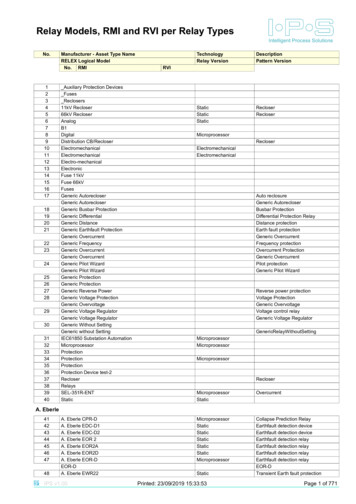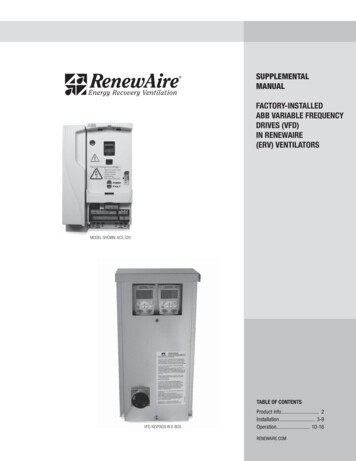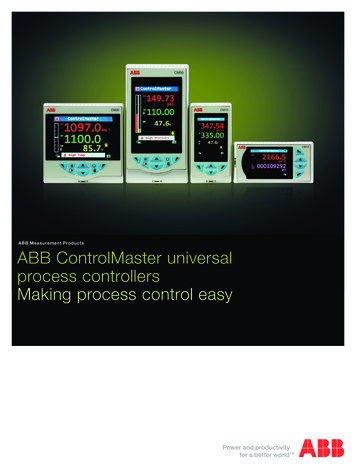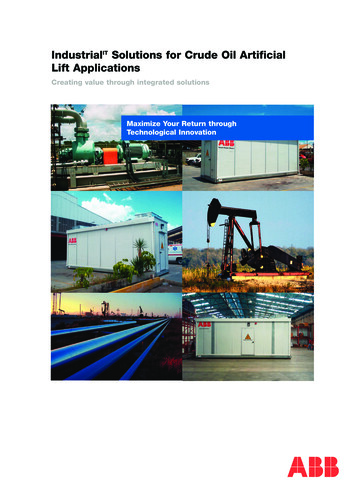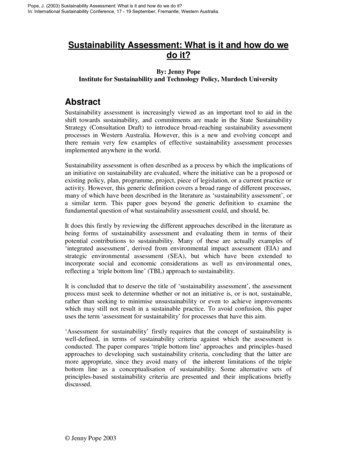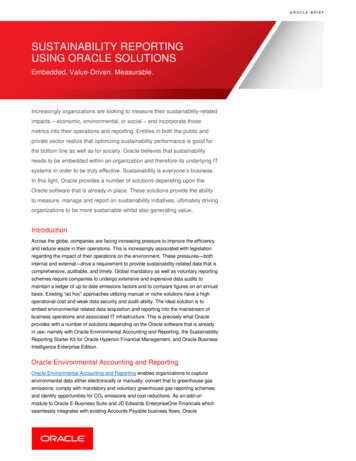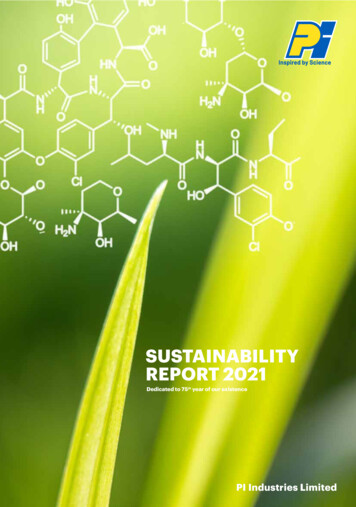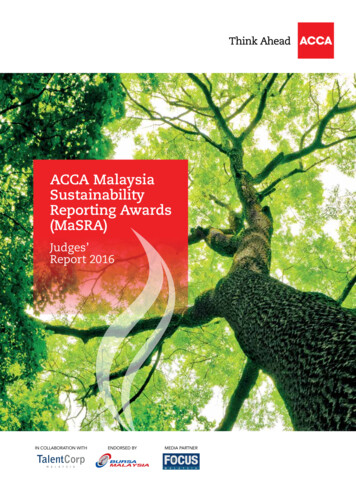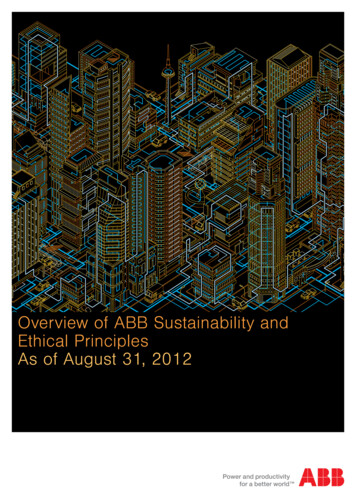
Transcription
Overview of ABB Sustainability andEthical PrinciplesAs of August 31, 2012
Overview of ABB Sustainability and Ethical PrinciplesLast update: August 31, 2012ABB seeks to uphold the highest standards in business ethics and integrity, including supporting efforts ofnational and international authorities to establish and enforce high integrity standards for all businesses. ABB hasa Code of Conduct and a Supplier Code of Conduct in place to help achieve these standards, and seeks continuousimprovement in its ethical, environmental, social and human rights performance.ABB seeks to integrate health and safety into all activities, encourage safety leadership at every level and ensureappropriate resources to achieve performance.ABB is committed to develop resource-efficient products and systems, to reduce the impacts of its own operations,and to engage in an ongoing dialogue with customers to help them select the most environmentally soundproducts, systems and solutions.ABB’s Human Rights and Social Policies draw on the Universal Declaration of Human Rights, the ILO CoreConventions on Labor Standards, UN Global Compact, the OECD Guidelines for Multinational Enterprises and theSocial Accountability 8000 standard.The ABB Human Rights and Social Policies specifically reference ILO Core Conventions as the minimum to beachieved, with respect to non-discrimination, prohibition of child and enforced labor, freedom of association andthe right to engage in collective bargaining.ABB seeks to do business with suppliers which have implemented governance, integrity, environmental, social,health and safety and human rights standards, as reflected in the ABB Supplier Code of Conduct.ABB strives to create a secure working environment for its employees, contractors and third parties. The companyequally seeks to maintain adequate management systems to minimize impact on people, assets and reputation,should an incident occur.Printed copies are uncontrolled copies. This version is current as of August 31, 2012.For latest version check www.abb.com/sustainabilityDoc name: Overview of ABB Sustainability and Ethical PrinciplesDep:GF-SACCP No.:7ABA102422Date:August 31, 2012Page:1/17
Table of ContentsOverview of ABB Sustainability and Ethical Principles11.Transparency and business practices with integrity32.Healthy and safe working environment (OHS)63.Environmental Responsibility84.Human Rights115.Supply Chain136.Security and crisis management plans157.Security of Confidential Information and Intellectual Property Rights168.Sustainability Governance169.References17Printed copies are uncontrolled copies. This version is current as of August 31, 2012.For latest version check www.abb.com/sustainabilityDoc name: Overview of ABB Sustainability and Ethical PrinciplesDep:GF-SACCP No.:7ABA102422Date:August 31, 2012Page:2/17
1. Transparency and business practices with integrityTransparentbusinesspractices1.1. ABB strives for success – but not at the expense of integrity andcompliance1.2. ABB seeks to uphold the highest standards in business integrity,including supporting efforts of national and international authorities toestablish and enforce high integrity standards for all businesses. Over300 people, both full time and part-time, work on our integrity programand processes. Regional and country integrity officers, covering allcountries in which we do business, are a fundamental part of ourintegrity team.Bribery andcorruption,illegal payments1.3. It is ABB’s declared objective to work against illegal payments in all itsforms, including corruption, extortion, improper payments and fraud, inline with ABB’s Code of Conduct, as well as OECD Guideline 6 andPrinciple 10 of the UN Global Compact. ABB is a member of theWorld Economic Forum ‘Partnering Against Corruption Initiative’(PACI) and is a signatory to the International Chamber of Commerce(ICC) anti-corruption rules.1.4. ABB policies strictly forbid bribery and corruption, applying rules for allABB employees in line with national laws and international treaties. Asa rule, facilitation payments are not permitted. ABB’s Group Directivesprovide specific guidelines for the practical application of the ABBCode of Conduct into our day-to-day activities. With a strong set ofinternal controls and a clear picture of what is expected of our ABBcommunity, we strive to create a culture of integrity reflected in ourbehavior.1.5. ABB policies require all employees to comply with all applicableantitrust and other laws regulating competition.ABB Code ofConduct andIntegrity Program1.6. The ABB Code of Conduct is built on our business principles ofResponsibility, Respect and Determination and requires ABBemployees to behave responsibly with regard to business relations.ABB has implemented the ABB Integrity Program. One function of theABB Integrity Program is to monitor ABB’s compliance with the Codeof Conduct which has been translated into 45 languages.1.7. All current and new employees are required to acknowledge theircommitment to adhere to the Code of Conduct. ABB maintains aregular re-acknowledgement process for the Code of Conduct bymanagers.Integrity training1.8. Throughout the Group we have rolled out mandatory Code of Conductand anti-bribery face to face and online training for all employees withadditional trainings for managers and employees in specific areas.Printed copies are uncontrolled copies. This version is current as of August 31, 2012.For latest version check www.abb.com/sustainabilityDoc name: Overview of ABB Sustainability and Ethical PrinciplesDep:GF-SACCP No.:7ABA102422Date:August 31, 2012Page:3/17
1.9. The ABB Integrity Program is supported by more than 60 Regionaland Country Integrity Officers in addition to local Integrity Officers,covering all countries with a permanent ABB presence.Ethics Hotline1.10. ABB offers employees multiple reporting channels and a BusinessEthics Hotline, available in over 90 languages, allows ABBemployees to report integrity concerns in an anonymous manner, ifthey wish, 24 hours a day, 7 days per week. A Stakeholder Hotline isalso available to our external business partners as a means to reportintegrity concerns.1.11. Employees are encouraged to speak up and report integrity andcompliance concerns and to seek guidance. All reports are subject toappropriate investigation, follow up, and are brought to full closure;there is also a systematic process and tracking system. ABBenforces a rigorous non-retaliation policy and has a whistleblowerprotection policy for employees who report concerns in good faith.1.12. ABB investigates all potential integrity or compliance concerns andcooperates fully with law enforcement agencies. Strict zero tolerancepolicy for violations of the law or the ABB Code of Conduct isenforced through systematic disciplinary actions. The process wasinstitutionalized in 2004 with the creation of the Human ResourcesDisciplinary Committee (HRDC) at headquarters. Additionalcommittees have been established at the regional level since 2008.Ombuds program1.13. ABB has an Ombuds program as an additional route for compliancereporting. This program ensures that employees have the opportunityto discuss questions and concerns confidentially and anonymously(when desired) about legal or ethical issues. There are currentlymore than 60 Ombudspersons in 47 countries where ABB operates.The Ombudspersons are experienced, well-known senior employeeswithin the business.Communication1.14. Articles are published regularly (every 10-14 days) on the corporateintranet site. These include real cases showing the consequences ofcompliance situations, videos, integrity update stories and a Q&Aseries, all with interactive discussions and the possibility ofsubscribing to new stories. Poster campaigns at all local sites aroundthe world to encourage reporting and raise awareness of specificareas of risk.Appointment ofrepresentatives1.15. Mandatory, substance-based due diligence is conducted prior to theappointment of ABB Representatives such as Intermediaries,Exclusive Distributors and Third Party Agents. There is a centralized,transparent approval process with appropriate controls overperformance prior to any payments.Printed copies are uncontrolled copies. This version is current as of August 31, 2012.For latest version check www.abb.com/sustainabilityDoc name: Overview of ABB Sustainability and Ethical PrinciplesDep:GF-SACCP No.:7ABA102422Date:August 31, 2012Page:4/17
Gifts, politicaland charitablecontributions1.16. ABB’s Gifts, Entertainment and Expenses policy defines thresholds,approval processes and their documentation, with additional controlsfor public officials.1.17. Political and Charitable Contributions are subject to detailed internalpolicy and controls.Reviewprocesses1.18. Throughout the year, the Internal Audit function conducts frequentAnti-Bribery Reviews of business units and countries to reviewbusiness processes, accounts and balances, and test transactions toassess robustness of controls and identify possible violations.1.19. Internal Surveys are conducted to understand employee attitudes,awareness and perceptions of integrity and compliance at ABB, andto monitor progress and address potential gaps in ABB’s culture ofintegrity.Alignment ofbusinesspartners1.20. Agreements with Suppliers, Subcontractors and Consortium Partnersare aligned with ABB’s commitment to integrity in the performance ofthe contract, including contractual commitments not to violate antibribery laws.For more information on ABB’s Integrity Program visit our website on:www.abb.com/integrityPrinted copies are uncontrolled copies. This version is current as of August 31, 2012.For latest version check www.abb.com/sustainabilityDoc name: Overview of ABB Sustainability and Ethical PrinciplesDep:GF-SACCP No.:7ABA102422Date:August 31, 2012Page:5/17
2. Healthy and safe working environment (OHS)Compliance withstandardsconcerning ahealthy and safeworkingenvironmentOHS Policy2.1. ABB strives to provide a safe and healthy working environmentat all sites and facilities that it owns and operates, and to take allreasonable steps to prevent incidents and injury to health arisingout of the course of work by minimizing or eliminating, so far asis reasonably practicable, the causes of hazards inherent in theworking environment.2.2. ABB has a Health and Safety Policy that supports the development ofa health and safety culture based on prevention. It also coversorganization, responsibilities and accountabilities for occupationalhealth and safety (OHS) within ABB.ProfessionalAdvisors2.3. ABB seeks to ensure that every facility, business and project hasOHSAS 180012.4. ABB’s Health and Safety Policy requires that all activities are coveredaccess to a professional OHS Advisor and maintains a thoroughfunctional competency assessment program in order to maintain andcontinually develop a professional network of advisors.by an OHS management system, meeting the requirements of OHSAS18001. There are separate checklists and tools in place for project,manufacturing and service organizations.LegalCompliance2.5. ABB’s goal at every stage of a project, service or manufacturing cycleILO Standards2.6. ABB’s Health and Safety standards are consistent with applicableis to meet or exceed applicable laws and international standards, asdefined in the Health and Safety Policy.international labor standards and ILO conventions as the minimumlevel of performance, namely with the ILO Convention C155(Occupational health and safety), ILO Convention C161 (Occupationalhealth services and preventive functions), ILO Convention C167(Safety and Health in Construction Convention) and ILO ConventionC29 (provision of potable water, sanitary facilities and necessaryequipment supply, as addressed in Article 17 of the convention).Integration ofOHS into ABBbusinessactivities2.7. ABB is integrating OHS into all activities, encouraging safetyContractors2.8. ABB’s Health and Safety Policy seeks to ensure that managementReportingcontrols are in place to prevent and/or minimize risks to and fromcontractors.2.9. Incident reporting, investigation and prevention systems are requiredat ABB’s sites, projects, and service operations for recording,reporting, and investigating fatal and serious incidents, lost timeleadership at every level. This is supported by an annual OHS Plan,approved by the Executive Committee, and a number of initiativesrelated to specific businesses in divisions, such as the ElectricalSafety initiative in Power Systems or the Transformer Safety initiativein Power Products.Printed copies are uncontrolled copies. This version is current as of August 31, 2012.For latest version check www.abb.com/sustainabilityDoc name: Overview of ABB Sustainability and Ethical PrinciplesDep:GF-SACCP No.:7ABA102422Date:August 31, 2012Page:6/17
injuries, medical treatment injuries, near misses and occupationaldiseases. The reporting process is supported by a global database.Investigations include root cause analysis and lessons learned areshared to minimize the risk of a recurrence and to improve existingwork practices, where necessary.2.10. ABB reports on its OHS performance in its annual SustainabilityPerformance Report.Review2.11. As defined in ABB’s Health and Safety Policy, management teamsare required to hold regular OHS reviews, and ensure that theyreceive routine reports on health and safety performance as definedby ABB, and drive a culture of continuous improvement.Implementation2.12. ABB’s OHS standards and guidelines define requirements for hazardidentification and risk assessment, including audit, evaluation andtraining procedures. These requirements cover all sites and facilitiesthat ABB owns and operates.2.13. The OHS standards include requirements for plant, machinery andwork equipment used in ABB’s business to be safe.2.14. When introducing new plant, work practices and/or equipment, healthand safety implications must be identified and controlled at eachstage of the project life cycle, in accordance with ABB OHS standardsand guidelines.Implementationof OHS policiesin the SupplyChain2.15. ABB’s policies require that suppliers have implemented a health andsafety policy and ensured that all operations and processes complywith relevant standards, legislation and international conventions.2.16. As a general objective, ABB wants to do business with suppliers whohave implemented health and safety management systems thatcomply with the requirements of OHSAS 18001.ABB supplierselection andevaluation withrespect to OHSissues2.17. ABB’s Health and Safety Policy requires that contractors andsuppliers observe ABB’s Health and Safety requirements, whereverapplicable. Their competence and capability to undertake the tasks ina safe and healthy way must be assessed against agreed standardsset in advance of the contract.2.18. Under ABB’s Supplier Qualification process, first-tier suppliers arerequired to identify and document the significant OHS risks in thescope of their supply to ABB, including the roles of sub-suppliers.They must also implement controls to eliminate or reduce these risks.Printed copies are uncontrolled copies. This version is current as of August 31, 2012.For latest version check www.abb.com/sustainabilityDoc name: Overview of ABB Sustainability and Ethical PrinciplesDep:GF-SACCP No.:7ABA102422Date:August 31, 2012Page:7/17
3. Environmental ResponsibilityImplementationof EnvironmentalResponsibility inABB’s activities3.1. ABB is committed to develop resource-efficient products andEnvironmentPolicy3.2. ABB’s Environment Policy focuses on the management ofISO 140013.3. ABB requires all of its manufacturing and service sites to developsystems, to reduce the impacts of its own operations, and toengage in an ongoing dialogue with customers to help themselect environmentally friendly products, systems andsolutions.environmental issues in key areas throughout the product life cycle,from the development phase through manufacturing and eventualdisposal and recycling.and maintain a management system based on ISO 14001. Morethan 80% of ABB manufacturing sites world-wide have achievedISO 14001 certification. In addition, 10% of ABB’s manufacturingsites have self-declared Environmental Management Systems(EMS) equivalent to ISO 14001 in place.Reporting3.4. ABB’s environmental reporting system covers ABB Groupcompanies. Annual environment reports are received fromapproximately 360 sites and cover more than 85% of employees.The reporting process is supported by a global database.3.5. ABB reports on its environment performance in its annualSustainability Performance Report.Monitoring andauditing ofenvironmentalperformance3.6. Regular environmental audits are organized by CountrySustainability Controllers (CSCs) according to the requirements oftheir local environmental management systems.3.7. External environmental audits occur approximately every threeyears according to the ISO 14001 certification requirements.3.8. At Group level, regulations with international impact are monitoredand communicated to the Country Sustainability Controllers (CSCs).CSCs and Local Sustainability Officers (LSOs) are responsible tomonitor the evolution of local environmental regulations andstandards and to communicate new and existing regulations withintheir respective organizations.Printed copies are uncontrolled copies. This version is current as of August 31, 2012.For latest version check www.abb.com/sustainabilityDoc name: Overview of ABB Sustainability and Ethical PrinciplesDep:GF-SACCP No.:7ABA102422Date:August 31, 2012Page:8/17
Products(EPD / LCA)3.9. ABB has a Group-wide GATE Model with environmentalcheckpoints in place that seeks to ensure that environmentalconsiderations are built into new products during their developmentphase.3.10. ABB publishes detailed Environmental Product Declarations (EPD),based on Life Cycle Assessments (LCA) over the entire life cycle ofits products, (from production of raw material to the recycling ofmaterial when the products are taken out of service). The EPDsprovide quantitative information in comparable terms, for exampleglobal warming effects and use of non-renewable resources in eachone of the phases.Management ofrestricted andpotentiallyhazardousmaterials3.11. It is one of ABB’s objectives to phase out the use of hazardousLists ofProhibited andRestrictedhazardoussubstances3.12. The management of hazardous and restricted materials at ABBEnergy/emissionsmanagement3.14. It is ABB’s objective to reduce the use of energy by 2.5 percentsubstances in products and processes, according to the ABB List ofProhibited and Restricted Substances. This list is developed andmaintained in accordance with relevant international regulations,such as the EU Directives on Restriction of Hazardous Substances(RoHS) and Registration, Evaluation, Authorization and Restrictionof Chemical Substances (REACH); China RoHS legislation.sites is addressed in a number of policies.3.13. ABB seeks to ensure responsible management and properprecautions in the use of SF6 in its products and maintains aspecialist core team to address these issues and monitorinternational developments.annually (measured in MWh/employee).3.15. ABB reports its environmental impact in accordance with relevantGlobal Reporting Initiative (GRI) indicatorsABB supplierselection andevaluation withrespect toenvironmentalissues3.16. As a general objective, ABB wants to do business with supplierswho have implemented environmental management systemscomplying with the requirements of ISO 14001 and who observeinternationally recognized social and human rights standards andnorms.Printed copies are uncontrolled copies. This version is current as of August 31, 2012.For latest version check www.abb.com/sustainabilityDoc name: Overview of ABB Sustainability and Ethical PrinciplesDep:GF-SACCP No.:7ABA102422Date:August 31, 2012Page:9/17
Implementationof environmentalresponsibility inthe supply chain3.17. Under ABB’s Supplier Qualification Self Assessment Process, allExpectedenvironmentalperformance andminimumstandards ofABB suppliers3.18. ABB’s Supplier Policy requires that suppliers have implemented anfirst-tier suppliers must identify and document significantenvironmental aspects in the scope of their supply to ABB,including the roles of sub-suppliers. They must also implementcontrols to eliminate or reduce these risks.environmental policy and ensure that all operations and processescomply with relevant standards, legislation and internationalconventions.3.19. According to ABB’s Supplier Requirements, suppliers may besubject to sustainability audits.Printed copies are uncontrolled copies. This version is current as of August 31, 2012.For latest version check www.abb.com/sustainabilityDoc name: Overview of ABB Sustainability and Ethical PrinciplesDep:GF-SACCP No.:7ABA102422Date:August 31, 2012Page:10/17
4. Human RightsHuman Rights4.1. ABB seeks to identify, assess and manage human rightsimpacts within its spheres of influence and activities inline with its Human Rights Policy and Statement. ABB hastaken a number of steps to embed human rightsawareness and practice throughout the organization.4.2. ABB’s Group-wide Human Rights and Social Policies draw onthe Universal Declaration of Human Rights, the ILO CoreConventions on Labor Standards, the OECD Guidelines forMultinational Enterprises, the Social Accountability 8000standard, and the UN Global Compact.4.3. The ABB Human Rights and Social Policies specificallyreference ILO Core Conventions as the minimum to beachieved, with respect to non-discrimination, prohibition ofchild and enforced labor, freedom of association and the rightto engage in collective bargaining.Integration ofHuman Rightsinto businessactivities4.4. ABB seeks to implement its Human Rights Policy in itsbusiness. Human rights questions are included in the riskreview process for every major project at ABB. Human rightscriteria are also included in Supply Chain questionnaires andin the Mergers and Acquisition process. ABB’s topmanagement is regularly briefed on human rights issuesaffecting the company. Human rights considerations are one ofthe factors in deciding whether to pursue operations insensitive countries.4.5. As a main principle, ABB seeks to promote human rights andto serve as a positive influence in communities where itoperates.Reporting4.6. ABB reports annually on human rights issues, according tocriteria appropriate to ABB in the Global Reporting Initiative.4.7. ABB seeks to participate where appropriate in public affairsinitiatives in a responsible way to promote internationallyrecognized human rights. ABB actively supports internationalinitiatives, such as the UN Global Compact and the GlobalBusiness Initiative on Human Rights, to strengthen businessunderstanding and share best practices on human rights.Printed copies are uncontrolled copies. This version is current as of August 31, 2012.For latest version check www.abb.com/sustainabilityDoc name: Overview of ABB Sustainability and Ethical PrinciplesDep:GF-SACCP No.:7ABA102422Date:August 31, 2012Page:11/17
Enforcement ofthe right offreedom ofassociation andcollectivebargaining4.8. According to the ABB Human Rights and Social Policies, andin line with ILO Conventions C87 and C98, ABB respects theright of all personnel to form and join trade unions of theirchoice and to bargain collectively. This is also covered byPrinciple 3 of the UN Global Compact.4.9. All ABB suppliers must recognize, as far as legally possible,the right of free association of employees and neither favornor discriminate against members of employee organizationsor trade unions.Elimination offorced andcompulsory labor4.10. ABB respects the human rights of its employees asAbolition of childlabor4.11. In line with ILO Conventions C138 (minimum age convention)Elimination ofdiscrimination inemployment andoccupation4.12. As defined in its Social Policy, ABB commits to offer equalityWorking hours4.13. ABB companies are required to comply with applicable lawsestablished in the ILO Conventions C29 and C105 and in linewith Principle 4 of the UN Global Compact, and prohibits anyform of forced and compulsory labor, as described in the ABBHuman Rights and Social Policies.and C182 (child labor convention), ABB commits itself to notuse any form of child labor. This is also in line with the UNGlobal Compact Principle 5.of opportunity to all employees and to oppose the use of anymental or physical coercion. ABB does not allow any form ofthreatening, abusive or exploitive behavior. ABB complieswith ILO Convention C111.and industry standards on working hours, including overtimeregulations, as defined in the ABB Social Policy. ABBregulations are in line with ILO Core Conventions (C14).4.14. ABB’s Supplier Policy requires suppliers to comply withapplicable laws and industry standards on working hours.Minimum wage4.15. ABB’s Social Policy requires that employee compensationmeets or exceeds the legal or industry minimum standards inaccordance with ILO Conventions.Printed copies are uncontrolled copies. This version is current as of August 31, 2012.For latest version check www.abb.com/sustainabilityDoc name: Overview of ABB Sustainability and Ethical PrinciplesDep:GF-SACCP No.:7ABA102422Date:August 31, 2012Page:12/17
5. Supply ChainImplementationof ABB Policiesand SupplierCode of Conduct5.1. ABB seeks to do business with suppliers who haveSupplierCompliance5.2. ABB requires that all companies that supply to ABB’s productionEnvironmental,OHS, Social andHuman RightsPerformance ofABB Suppliers5.3. Suppliers are expected to support and respect the protection ofSupplierSelection andQualificationProcess5.4. ABB has incorporated social performance criteria, including humanimplemented governance, environmental, social, health andsafety and human rights standards consistent with thoseapplied within ABB, as summarized in the ABB Supplier Codeof Conduct.process have implemented an environment, and health and safetypolicy to ensure that all operations and processes comply withrelevant standards, legislation and international conventions.internationally proclaimed human rights and ensure equality ofopportunity. Especially:- Suppliers must comply with applicable laws and industrystandards on working hours and offer adequate wages to theiremployees.- Suppliers must not employ children or support the use of childlabor, make use of forced labor or harass or discriminate againstemployees.- As an ABB requirement, a senior manager at the supplier has tobe accountable for ensuring that systems and procedures forsocial responsibility are in place.rights performance, into its suppliers qualification process (SQP)requirements.Under ABB’s Supplier Qualification Self-Assessment Process, allfirst-tier suppliers must identify and document the significantenvironmental aspects and Occupational Health & Safety (OHS)risks in the scope of their supply to ABB, including the roles of subsuppliers. They must also implement controls to eliminate or reducethese risks.Printed copies are uncontrolled copies. This version is current as of August 31, 2012.For latest version check www.abb.com/sustainabilityDoc name: Overview of ABB Sustainability and Ethical PrinciplesDep:GF-SACCP No.:7ABA102422Date:August 31, 2012Page:13/17
5.5. As a general objective, ABB wants to do business with supplierswho have implemented environmental and health and safetymanagement systems, complying with the requirements ofISO14001 and OHSAS 18001 and who observe internationallyrecognized social and human rights standards and norms.5.6. ABB’s Human Rights policy specifically seeks to establish andmaintain appropriate procedures to evaluate and select first-tiersuppliers and contractors and to monitor their performance wherenecessary.5.7. ABB maintains appropriate procedures to evaluate and select firsttier suppliers and subcontractors on their ability to meet therequirements of ABB’s social policy and principles and to maintainreasonable evidence that these requirements are continuing to bemet.5.8. ABB seeks to ensure that contractors and suppliers are selectedthat perform to ABB’s Health and Safety requirements. Theircompetency and capability to undertake the tasks in a safe andhealthy way must be assessed against set standards before theaward of the contract.Audits, continualmonitoring andtraining5.9. In its Supplier Qualification Process, ABB states that units arerequired to conduct supplier audits including sustainability criteria atboth qualification stage and at any time during the period ofsupplying to ABB. ABB expects to conduct several hundred suchprocess and quality audits each year.5.10. In order to interpret key sustainability issues during audits andtraining, ABB has implemented Group-wide guidelines for auditorsand managers for continual monitoring of suppliers' sustainabilityperformance.Printed copies are uncontrolled copies. This version is current as of August 31, 2012.For latest version check www.abb.com/sustainabilityDoc name: Overview of ABB Sustainability and Ethical PrinciplesDep:GF-SACCP No.:7ABA102422Date:August 31, 2012Page:14/17
6. Security and crisis management plansSecurity andCrisisManagementPlans6.1. ABB seeks to ensure an appropriate level of security and crisisresponse management throughout the Group with the aim ofsecuring its employees and contractors worldwide, and toprotect business continuity.6.2. ABB has rapid response capabilities and experienced crisismanagement teams to respond to potential crises. Crisis responseplans and Group- and country-specific crisis response manualsdefine responsibilities, procedures and crisis communicationprocesses. ABB’s security team holds regular crisis exercises in allregions.Pandemic plans6.3. ABB has implemented a Group-wide program to deal with pandemicdiseases, and regularly assesses the situation. Every country isrequired to have a p
Overview of ABB Sustainability and Ethical Principles GF-SA 7ABA102422 August 31, 2012 2/17 Table of Contents Overview of ABB Sustainability and Ethical Principles 1 1. Transparency and business practices with integrity 3 2. Healthy and safe working environment (OHS) 6 3. Environmental Responsibility 8 4. Human Rights 11 5. Supply Chain 13 6.
